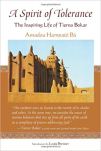
 Amadou Hampaté Bâ was a writer well-known in his native country of Mali and beyond. He lived 90 years and wrote both fiction and nonfiction. In 1957, he wrote a biography of and collection of teachings by his spiritual leader, Tierno Bokar. He rewrote the book in 1980, and it was published in English as A Spirit of Tolerance: The Inspiring Life of Tierno Bokar — translated by Fatima Jane Casewit — only in 2008.
Amadou Hampaté Bâ was a writer well-known in his native country of Mali and beyond. He lived 90 years and wrote both fiction and nonfiction. In 1957, he wrote a biography of and collection of teachings by his spiritual leader, Tierno Bokar. He rewrote the book in 1980, and it was published in English as A Spirit of Tolerance: The Inspiring Life of Tierno Bokar — translated by Fatima Jane Casewit — only in 2008.Tierno Bokar was a Muslim spiritual teacher and Sufi mystic from what would become Mali. He lived from 1875 to 1939.
In the first half of this book, Bâ paints Bokar as a wonderfully wise, tolerant teacher. The tone is deeply loving, even hagiographic. Later in Bokar’s life, his reputation was destroyed as adversaries used a difference in religious interpretation against him. Some of this part of the book was challenging for me to follow given my complete lack of background.
The second half of the book recounts Bokar’s teachings. I’m not Muslim nor Sufi, but I found much to enjoy and to consider.
Here are some passages that struck me:
-
On memory: “In Africa, when an old person dies, it is as if a library has burned down.” (Amadou Hampaté Bâ)
-
On saying no: “If you ask a favor of the people of Segou and they want to refuse it, they will do so with so much intelligence and courtesy that you will find yourself obliged to thank them.” (Fily Dabo Sissoko)
-
On physical violence: “Material weapons can only destroy matter but not the principle of evil itself, which always rises from the ashes stronger than ever? Evil, he was to teach us, can only be destroyed by Goodness and Love.” (Bâ paraphrasing Bokar)
-
On being eighteen: “He was eighteen, the age of torment, the age of many dreams, of many pathways.” (Bâ)
-
On self-denial: “It is necessary to deprive the soul of some things that are permitted so that it does not aspire to things that are forbidden to it.” (alGhazali)
-
On using religion poorly: “Tierno Bokar was the victim of the ignorance and obscurantism of men who confused clan loyalty with religious commitment and who had forgotten that tolerance is a fundamental principle in Islam.” (Bâ)
-
On simplicity of expression: “He had an aversion to those who expressed themselves in anything other than ordinary language.” (Bâ on Bokar)
-
On clarity of language: “One of the characteristics of ‘sorcerers’ was to use impenetrable language.” (Bâ)
-
On teaching: “Speak to people according to the level of their understanding” (Bâ quoting the Prophet)
-
On learning about other religions: “You will gain enormously by knowing about the various forms of religion. Believe me, each one of these forms, however strange it may seem to you, contains that which can strengthen your own faith.” (Bokar)
-
On humor: “Always being overly serious is something that cannot be taken seriously!” (Bokar)
-
No one has a pure pedigree: “Do not dig too much around the roots of the illustrious trunk of your origins because beyond several layers of earth you risk discovering that the roots originate in a mass of refuse.” (Bokar)
-
In other words, “from every royal palace you will find an alleyway that leads to the thatched cottage of a poor person.” (Bokar)
-
On detachment: “It is for man to act, using all of his faculties, but then to keep his heart serene concerning the outcome of his actions.” (Bâ)
-
On spiritual knowledge: “There are three ways to know a river: First of all, there is the man who has heard the river spoken about and becomes capable by imitation and repetition to describe it without having seen it himself. This is the first degree of knowledge. Then there is the man who has undertaken the journey and who has arrived at the banks of the river. Seated on the banks of the river, he contemplates it with his own eyes and is a witness to its majesty. This is the second degree of knowledge. Finally, there is the man who throws himself into the river and becomes one with it. This is the supreme degree of Knowledge.” (Bokar)
-
On the sacred around us: “Islam is not an escape towards the sacred, but rather, a conscious integration of the sacred on all planes of existence.” (Bâ?)se.
This is book #48 in my effort to read a book by an author from every African country in 2019. You can read reviews of all the books here.